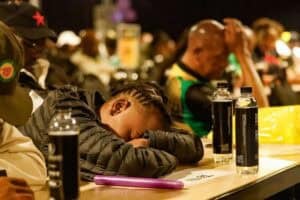Ballot papers have been taken from the 2,200 polling stations to regional district centres, where they are being counted by hand.

Vote counting was under way Thursday in Botswana in a tight election seen as the first real political test for a country ruled by the same party since independence.
Pre-election polling showed the Botswana Democratic Party (BDP), battered by an unprecedented internal crisis and new political rivals, would win the vote but return to parliament with a reduced majority.
The BDP, which has ruled since Botswana became independent from Britain in 1966, suffered a seismic jolt in May when former president Ian Khama renounced his hand-picked successor, Mokgweetsi Masisi.
Khama stormed out after accusing his former deputy of autocracy and threw his weight behind the Umbrella for Democratic Change (UDC), once his fiercest critic.
He then endorsed a new political party, the Botswana Patriotic Front (BPF), which has fielded candidates in only 19 of the 57 constituencies.
After casting his ballot in his home village of Moshupa, 65 kilometres (40 miles) west of Gaborone on Wednesday, Masisi admitted that this was “the toughest election we have had to fight.”
Botswana is seen across southern Africa as a beacon of continuity and democracy.
Should the BDP lose the vote, it would be the first time Botswana, a country famed for its diamonds and wildlife, has seen a change of government in 53 years.
Ballot papers have been taken from the 2,200 polling stations to regional district centres, where they are being counted by hand.
Results sheets will then be faxed to the national offices of the Independent Electoral Commission in Gaborone.
The winner will be declared once a party attains 29 parliamentary seats – the minimum requirement to form a government.
IEC spokesman Osupile Maroba told reporters: “Counting itself is very slow, it’s manual and sometimes it may even extend depending on the requests for recounts from candidates if at all they are not happy.
“We hope by tomorrow this time we should be having quite an informative outcome of our counting,” he said.
As counting was underway at Babusi Community Hall in Gaborone’s Bontleng neighbourhood, dozens of BDP and UDC supporters dressed in their party colours staged a vigil outside, singing and dancing.
Groups of around one hundred each side carried placards and umbrellas, marched towards each and happily made way for each other. Some even hugged each other as they awaited the results.
Polling generally proceeded smoothly across the vast, sparsely populated country of 2.2 million people, according to the electoral commission, despite delays in clearing voters at some polling stations.
But the UDC, which poses the first and greatest challenge so far to BDP dominance, issued a statement overnight charging that the voting was flawed.
“It appears that our greatest fears have become a reality, that (these) elections will not be fair,” it said.
The UDC, which won 17 out of the 57 seats in the last election five years ago, said it had received complaints “about widespread election irregularities”, including “unnecessary delays” at various polling stations across the country.
But the electoral commission said it had yet to receive any complaints about the voting.
Complainants have 30 days to lodge petitions after results are declared and the chief justice has named the leader of the winning party, the state president.
If none of the parties attain the minimum 29 seats, a hung parliament convenes and the newly-elected lawmakers vote for a president.
For more news your way, download The Citizen’s app for iOS and Android.






